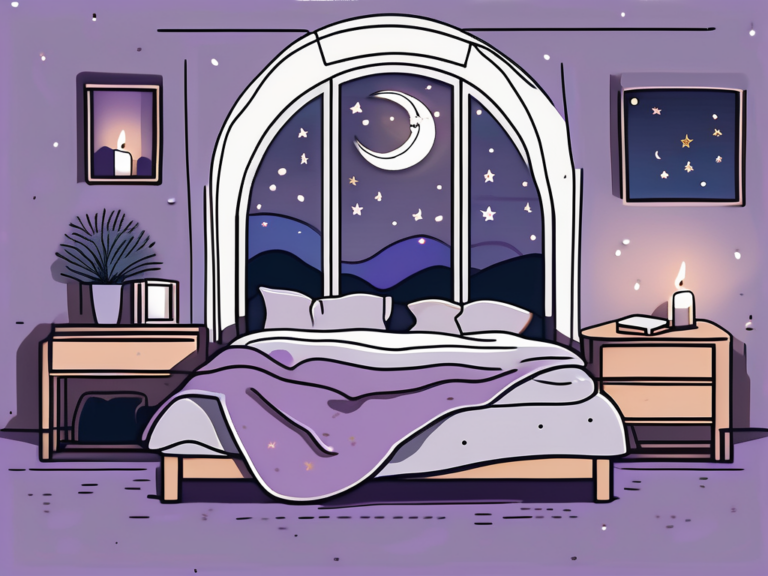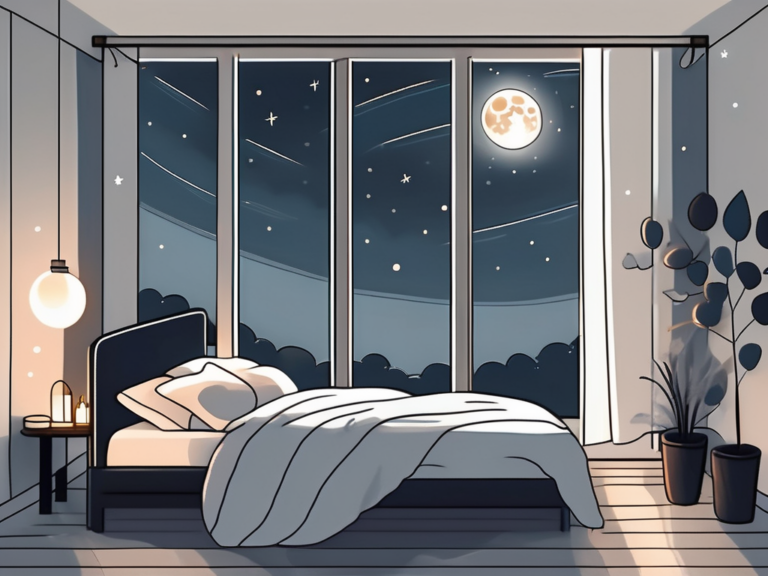Tips on How to Fall Asleep Quickly
We all know the feeling of lying in bed, staring at the ceiling, and desperately wishing for a good night’s sleep. Whether it’s due to stress, an overactive mind, or external factors, struggling to fall asleep can be incredibly frustrating. In this article, we will explore various strategies and techniques to help you fall asleep quickly and enjoy a restful night’s sleep.
Understanding the Importance of Sleep
Sleep is a vital biological process that plays a crucial role in our overall health and well-being. It allows our bodies and minds to rest, repair, and recharge. Without sufficient sleep, we may experience a host of negative effects, including daytime drowsiness, difficulty concentrating, mood swings, and weakened immune function.
The Science Behind Sleep
During sleep, our bodies undergo various physiological changes. Our brain waves slow down, our breathing becomes more relaxed, and our muscles relax. This state of rest allows our bodies to repair tissues, consolidate memories, and regulate hormonal balance. The sleep cycle consists of different stages, including light sleep, deep sleep, and rapid eye movement (REM) sleep, each playing a unique role in restoring our physical and mental well-being.
Why Quality Sleep Matters
It’s not just the quantity of sleep that matters but also the quality. Poor sleep quality, characterized by frequent awakenings or disturbances, can lead to feelings of fatigue and grogginess, even after seemingly getting enough hours of sleep. Quality sleep is essential for our bodies to undergo the necessary restorative processes and wake up feeling refreshed and revitalized.
Now, let’s delve deeper into the fascinating world of sleep and explore some interesting facts. Did you know that sleep deprivation can have serious consequences on our cognitive abilities? Research has shown that lack of sleep can impair our attention, memory, and decision-making skills. This is because sleep plays a crucial role in consolidating information and forming new neural connections in our brains.
Furthermore, sleep is not just important for our mental well-being but also for our physical health. During sleep, our bodies release growth hormones that aid in tissue repair and muscle growth. This is why athletes and fitness enthusiasts prioritize getting enough sleep to enhance their performance and recovery.
Another intriguing aspect of sleep is dreaming. Dreams occur during the REM stage of sleep when our brain activity becomes more active. Dreams can be vivid and imaginative, sometimes reflecting our subconscious thoughts and emotions. They can provide valuable insights into our psyche and help us process our experiences.
Identifying Sleep Disruptors
Various factors can disrupt our sleep patterns and make it challenging to fall asleep quickly. By identifying these sleep disruptors, we can take proactive steps to minimize their impact and improve our sleep quality.
Common Causes of Insomnia
Insomnia, the inability to fall asleep or stay asleep, can be caused by a multitude of factors. These may include stress, anxiety, depression, chronic pain, certain medications, and underlying medical conditions. Identifying the root cause of your insomnia is the first step towards finding effective solutions to overcome it.
Stress, one of the leading causes of insomnia, can stem from various sources such as work, relationships, or financial concerns. When we are under stress, our bodies release stress hormones like cortisol, which can interfere with our ability to relax and fall asleep. Additionally, anxiety, which often accompanies stress, can create a constant state of worry and restlessness, making it difficult to unwind and find the tranquility needed for a good night’s sleep.
The Impact of Stress and Anxiety on Sleep
High levels of stress and anxiety can significantly disrupt our sleep. The incessant worrying and racing thoughts make it challenging for our minds to find the peace and relaxation necessary for falling asleep. Incorporating relaxation techniques such as deep breathing exercises, meditation, or listening to soothing music before bedtime can help alleviate stress and promote a more restful sleep.
Furthermore, chronic pain can also contribute to sleep disturbances. Conditions like arthritis, fibromyalgia, or back pain can cause discomfort that prevents us from finding a comfortable sleeping position. The constant tossing and turning to find relief can lead to fragmented sleep and a lack of restorative rest.
Moreover, certain medications can have side effects that interfere with sleep. Stimulants like caffeine or medications for conditions such as asthma or allergies can disrupt our sleep-wake cycle and make it harder to fall asleep. It is essential to discuss any potential sleep disruptions with your healthcare provider to explore alternative options or adjust your medication regimen.
Creating a Sleep-Inducing Environment
Creating a sleep-friendly environment is key to optimizing your chances of falling asleep quickly. Several factors, such as light, temperature, and bedding choices, can influence the quality of your sleep environment.
The Role of Light and Temperature
Exposure to bright light, particularly blue light emitted by electronic devices, can interfere with our natural sleep-wake cycle. Limiting screen time before bed and ensuring a dark, cool room can promote the production of melatonin, the sleep hormone, and aid in falling asleep faster.
When it comes to light, it’s not just about turning off your devices. Consider investing in blackout curtains or blinds to block out any unwanted light from street lamps or the early morning sun. These curtains are designed to create a pitch-black environment, mimicking the darkness of a cave, which can help signal to your brain that it’s time to sleep.
As for temperature, finding the right balance is crucial. Research suggests that a cool room, around 65 degrees Fahrenheit (18 degrees Celsius), is ideal for promoting sleep. However, everyone’s preferences may vary, so it’s essential to find a temperature that suits you best. Experiment with different bedding materials and adjust the thermostat until you discover the perfect sleep-inducing temperature.
Choosing the Right Bedding and Mattress
Your bedding and mattress play a crucial role in your sleep comfort. Opt for a mattress that provides adequate support and suits your individual preferences. A mattress that is too firm or too soft can lead to discomfort and restless nights. Take the time to test different mattresses and find the one that offers the perfect balance of support and comfort for your body.
When it comes to bedding, it’s not just about aesthetics. Selecting breathable, comfortable materials can regulate body temperature and enhance your overall sleep experience. Natural fibers like cotton and bamboo are excellent choices as they are breathable and can wick away moisture, keeping you cool and dry throughout the night. Additionally, consider investing in high-quality pillows and mattress toppers that provide extra cushioning and support for a truly luxurious sleep experience.
Developing a Pre-Sleep Routine
Establishing a relaxing pre-sleep routine can signal to your body that it’s time to wind down and prepare for sleep. Consistency is key when developing a routine that works for you.
The Power of Relaxation Techniques
Incorporating relaxation techniques into your pre-sleep routine can significantly improve your sleep quality. Activities such as taking a warm bath, practicing gentle stretching exercises, or enjoying a cup of herbal tea can help soothe your body and mind.
Picture this: you step into a warm, fragrant bath, the soothing scent of lavender filling the air. As you sink into the water, you feel the tension in your muscles melt away, and a sense of calm washes over you. This simple act of self-care not only cleanses your body but also prepares your mind for a restful night’s sleep.
The Benefits of a Consistent Sleep Schedule
Keeping a regular sleep schedule can regulate your body’s internal clock and improve your sleep efficiency. Aim to go to bed and wake up at the same time every day, even on weekends, to maintain a steady sleep pattern.
Imagine this: you wake up feeling refreshed and energized, ready to tackle the day ahead. This is the power of a consistent sleep schedule. By training your body to follow a regular sleep routine, you are setting yourself up for success in both your personal and professional life.
When you establish a consistent sleep schedule, your body becomes accustomed to a specific rhythm. It knows when it’s time to wind down and when it’s time to wake up. This internal clock, also known as your circadian rhythm, helps regulate various bodily functions, including hormone production, metabolism, and immune system activity.
By maintaining a steady sleep pattern, you allow your body to optimize these functions, leading to improved overall health and well-being. Not only will you experience better sleep quality, but you may also notice increased focus, enhanced mood, and a boost in productivity throughout the day.
Nutritional Tips for Better Sleep
Your diet can have a direct impact on your sleep quality. Certain foods and substances can either promote or hinder your ability to fall asleep quickly.
Foods That Promote Sleep
Several foods contain sleep-promoting compounds that can naturally enhance your sleep quality. Incorporating foods rich in tryptophan, magnesium, and melatonin, such as bananas, nuts, seeds, warm milk, and tart cherries, into your evening meals or snacks can have a positive impact on your sleep.
Let’s take a closer look at these sleep-enhancing foods:
- Bananas: Not only are bananas a delicious and nutritious snack, but they also contain tryptophan, which is converted into serotonin and then melatonin in the body. These hormones help regulate sleep-wake cycles.
- Nuts and Seeds: Almonds, walnuts, flaxseeds, and chia seeds are all excellent sources of magnesium, a mineral that plays a crucial role in promoting relaxation and sleep.
- Warm Milk: A warm glass of milk before bed is a classic sleep remedy. Milk contains tryptophan, which can help you feel calm and ready for sleep.
- Tart Cherries: Tart cherries are one of the few natural food sources of melatonin, a hormone that regulates sleep. Incorporating tart cherry juice or dried cherries into your evening routine may improve your sleep quality.
The Effects of Caffeine and Alcohol on Sleep
While a cup of coffee or a glass of wine may seem like a delightful way to wind down, these substances can disrupt your sleep cycle. Caffeine is a stimulant that can interfere with falling asleep, while alcohol may initially make you drowsy but disrupts the deeper stages of sleep. Limit your consumption of these substances, particularly in the evening, for better sleep outcomes.
Let’s delve deeper into the effects of caffeine and alcohol on sleep:
Caffeine: Found in coffee, tea, chocolate, and some medications, caffeine stimulates the central nervous system, making it harder to fall asleep. It is recommended to avoid consuming caffeine at least six hours before bedtime to minimize its sleep-disrupting effects.
Alcohol: While alcohol may initially make you feel sleepy, it can disrupt the quality of your sleep. It reduces rapid eye movement (REM) sleep, which is important for memory consolidation and overall sleep quality. If you choose to drink alcohol, it’s best to do so in moderation and avoid consuming it close to bedtime.
By being mindful of the foods you consume and their impact on sleep, you can make small but significant changes to improve your sleep quality. Incorporating sleep-promoting foods and limiting caffeine and alcohol intake can contribute to a more restful and rejuvenating night’s sleep.
Physical Activity and Sleep Quality
Regular physical activity offers numerous health benefits, including improved sleep quality. Engaging in regular exercise can aid in falling asleep faster and experiencing deeper, more restorative sleep.
How Exercise Can Improve Sleep
Exercise has been shown to reduce symptoms of insomnia and contribute to better sleep quality. Physical activity promotes the release of endorphins, reduces stress levels, and tires out the body, all of which can facilitate falling asleep and staying asleep longer.
The Best Time to Exercise for Optimal Sleep
When it comes to optimizing sleep outcomes, timing is crucial. Avoid vigorous exercise close to bedtime, as this can increase alertness and make it challenging to wind down. Instead, aim to complete your workout session at least a few hours before bedtime to allow your body temperature and adrenaline levels to return to normal.
Exercise and Sleep Duration
In addition to improving sleep quality, regular physical activity can also help increase the duration of sleep. Studies have shown that individuals who engage in moderate to high-intensity exercise tend to have longer sleep durations compared to those who are sedentary. This can be attributed to the fact that exercise helps regulate the body’s internal clock, known as the circadian rhythm, which plays a crucial role in determining sleep-wake cycles.
The Impact of Exercise on Sleep Architecture
Not only does exercise improve sleep duration and quality, but it also has a positive impact on sleep architecture. Sleep architecture refers to the different stages of sleep, including light sleep, deep sleep, and rapid eye movement (REM) sleep. Regular physical activity has been found to increase the amount of deep sleep and REM sleep experienced during the night, leading to a more restorative and rejuvenating sleep experience.
By incorporating exercise into your daily routine, you can reap the benefits of improved sleep quality, longer sleep duration, and enhanced sleep architecture. Remember to choose activities that you enjoy and are suitable for your fitness level. Consult with a healthcare professional before starting any new exercise program, especially if you have any underlying health conditions.
When to Seek Professional Help
Though incorporating healthy sleep habits can improve your sleep quality, certain situations may require professional guidance to overcome sleep disturbances.
Recognizing Chronic Sleep Disorders
If you consistently struggle with falling asleep and staying asleep, it may be indicative of an underlying sleep disorder. Conditions such as sleep apnea, restless leg syndrome, or narcolepsy necessitate proper diagnosis and treatment from qualified sleep professionals.
The Role of Sleep Therapists and Clinics
Sleep therapists and clinics specialize in diagnosing and treating various sleep disorders. They can provide tailored treatment plans, including cognitive-behavioral therapy for insomnia (CBT-I) and recommend appropriate interventions to help you overcome sleep challenges and improve your sleep quality.
However, it’s important to note that seeking professional help is not limited to those with chronic sleep disorders. There are other situations where it may be beneficial to consult a sleep professional.
Shift Workers and Sleep
If you are a shift worker, your sleep patterns may be disrupted due to irregular working hours. Shift work sleep disorder is a condition that affects individuals who work during the night or have rotating shifts. This disorder can lead to difficulties falling asleep, staying asleep, and feeling rested. Sleep therapists can assist shift workers in developing strategies to optimize their sleep schedule and minimize the negative impact of shift work on their overall well-being.
Insomnia and Psychological Factors
Insomnia is a common sleep disorder characterized by difficulty falling asleep or staying asleep, despite having the opportunity to do so. While it can be caused by various factors, including medical conditions and lifestyle choices, psychological factors such as stress, anxiety, and depression can significantly contribute to insomnia. Sleep therapists can help individuals identify and address these underlying psychological factors through therapy techniques such as CBT-I, which focuses on changing negative thoughts and behaviors related to sleep.
In conclusion, falling asleep quickly is an achievable goal by implementing strategies to optimize sleep quality. By understanding the importance of sleep, identifying sleep disruptors, creating a sleep-inducing environment, developing a pre-sleep routine, adopting nutritional tips, engaging in physical activity, and seeking professional help when necessary, you can significantly improve your ability to fall asleep quickly and enjoy a restful night’s sleep. Incorporate these tips into your daily routine and watch as your sleep quality and overall well-being improve.






